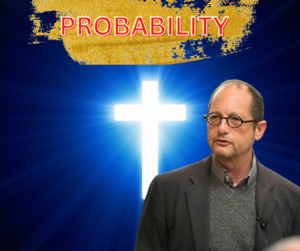As Christian Apologists, it’s important we learn to play the accordion. What I mean by that is that we need to learn when to go in-depth in explaining the arguments and evidence for Christianity and when to compress our case into a presentation of 5 minutes or less. Just as you expand and contract when playing the accordion, we need to expand and contract (depending on the situation) when presenting the arguments for Christianity. I wrote an article a while back called “A Quick Case For Jesus’ Resurrection” which took a long article explaining several arguments undergirding the case for the resurrection and compressed them into an article that takes only a few minutes to read. That article was helpful for two reasons: (1) It reached people with short attention spans, and (2) it helped believers more easily memorize the data, since it was about as expansive as a student’s notes.
I’m going to do an article just like that, only this time, I’ll be talking about the historical evidence for Jesus’ self-understanding. Did Jesus claim to be God? Many skeptics say no, but let’s look at the evidence.
Historical Methodology, Not “Using The Bible To Prove The Bible”
I will be examining the sayings and doings of Jesus in the gospels, but this doesn’t mean I’m begging the question, as skeptics will accuse me of. I’ll appeal to the gospels, but I’ll treat them the same way historians treat other historical documents. When historians are examining documents and are trying to figure out whether what they say is true, they’ll employ certain tests or “criteria” to the recorded events in question. If one or more of the criteria can be applied to the text(s), the historian concludes that it’s likely the event actually occurred.
For example, if historians looked at a letter written by George Washington, and Washington wrote that while horseback riding out in the countryside, he soiled himself, had to go behind a tree, and go commando the next day, historians would conclude it’s more likely than not that Washington is telling the truth. This is because Washington is mentioning an event that is embarrassing. People don’t make up lies that embarrass them. So, on the principle of embarrassment, the historian would conclude it’s true. If historians found 3 independent sources that also mention Washington soiling himself on this occasion, they would conclude it’s even more probable that it’s a historical event. This time on The Principle Of Multiple Attestation. The more and more independent sources you find an event mentioned in, the less and less likely it is to be made up. Multiple different people simply cannot conjure up the same fiction and treat it as history.
A few of the principles of authenticity are listed as follows:
1: The Principle Of Multiple Attestation — If an event is mentioned in 2 or more independent documents, it is far more likely that the event occurred.
2: The Principle Of Embarrassment — If a recorded event is embarrassing to the author, hurts an argument he’s trying to make, or embarrasses someone he cares about, then it’s very likely to be true.
3: The Principle Of Early Testimony — The earlier a document is relative to the event it records, the more reliable it is, as there’s less of a chance for things to get distorted.
4: The Principle Of Historical Fit — If a recorded incident fits well with known and established historical facts of the particular time and place that the historical document talks about, then that favor’s the document’s event’s historicity.
5: The Principle Of Dissimilarity — If a saying of Jesus cannot be derived from the Judaism that preceded him or the Christian church that followed, it’s likely to be historical.
The Three Titles Of Jesus
Jesus claimed three titles for himself which imply divinity. First, we’ll look at what Jesus said, then we’ll try to discern what Jesus meant.
Title 1: Son Of Man
In the gospels, Jesus claims to be the Son Of Man 88 times. He said things like in Mark 10:45, “For even the Son of Man did not come to be served, but to serve, and to give his life as a ransom for many.” And “Foxes have dens and birds have nests, but the Son of Man has no place to lay his head.” (Matthew 8:20). How do we know Jesus actually said these things rather than the gospel writers just inserting them into the mouth of Jesus?
*The Principle Of Dissimilarity
Although Jesus calls Himself “The Son Of Man” 88 times in the gospel accounts, He is never once referred to by this title in The New Testament epistles. Moreover, in the writings of the early church Fathers, he is rarely called by this title. On the basis of the principle of dissimilarity, it’s very likely this title wasn’t made up. If it were made up by the apostles or the early church, we would expect to see them using this title when describing Jesus frequently. But while the epistles and the church fathers frequently refer to Jesus as “Christ”, “Jesus Christ”, “Messiah”, and “Son Of God”, the Son of Man title is scarce.
*The Principle Of Embarrassment
There’s one place where Jesus calls himself The Son Of Man that isn’t very flattering towards Him. . . In Matthew 8:20, Jesus says “And Jesus said to him, ‘Foxes have holes and birds of the air have nests, but the Son of Man has nowhere to lay His head.'” – (NKJV) It is unlikely that Matthew made this sentence up. Why? Because it depicts Jesus as homeless. It’s unlikely the early church would make up a saying of Jesus that emphasizes his homelessness. Therefore, by the principle of embarrassment, this saying by Jesus is very likely to be historical.
*Multiple Attestation
Not only do the Synoptics record Jesus as calling Himself The Son Of Man (e.g Matthew 8:20, Matthew 11:19, Mark 10:45), but John records Jesus as calling Himself this as well (e.g John 3:13, John 6:62). The Synoptics and John are independent sources, and therefore, there’s multiple attestation. Highly unlikely both the Synoptics and John would invent The Son Of Man title and ascribe it to Jesus
*The Son Of Man Figure Was A Divine Figure In Old Testament Prophesy
Daniel 7:13-14 says “In my vision at night I looked, and there before me was one like a son of man, coming with the clouds of heaven. He approached the Ancient of Days and was led into his presence. He was given authority, glory and sovereign power; all nations and peoples of every language worshiped him. His dominion is an everlasting dominion that will not pass away, and his kingdom is one that will never be destroyed.”
So, Jesus was claiming to be the person talked about in this Old Testament prophesy.
Son of man is (1) given authority, glory, and sovereign power, (2) has an everlasting dominion, (3) people all over the world worship Him (Daniel 7:13-14), he has the ability to forgive sins (Luke 5:19-25), and existed prior to his physical birth (John 3:13, John 6:62). That sounds a lot like God to me. Lest one doubts the “son of man” Jesus claimed to be is the Daniel 7 figure, check out His response to Caiaphas at his trial; “I am, and you will see The Son Of Man seated at the right hand of the Mighty One and coming with the clouds of Heaven“. (Mark 14:62). Notice also that Jesus says The Son Of Man will be seated at God’s right hand (i.e on His throne). In light of all this, no wonder Caiaphas accused Jesus of blasphemy (Mark 14:63). Of course, it’s only blasphemy if it isn’t true.
Title 2: The Son Of God
Jesus claimed to be The Son Of God as well, but skeptics usually dismiss this saying that others have claimed this title, and they’re not divine. For example, angels were called sons of God in the book of Job (1:6) and Genesis (6), in Christian theology, all Christian males can be considered God’s sons. However, this neglects the fact that Jesus connected his title to be The Son Of God with certain claims that no mere human could make.
But first, how do we know Jesus claimed this?
*The Principle Of Embarrassment
Mark 13:32 says “But about that day or hour no one knows, not even the angels in heaven, nor the Son, but only the Father.” Unlikely this saying is made up since it makes Jesus look less than omniscient. If the gospels were evolved theology to make Jesus divine, they’d never make up this phrase.
This entails Jesus is God because he employs a figure of speech called anabasis. Anabasis = an ascending scale with increasing emphasis. Example: “I wouldn’t do X for a hundred dollars! I wouldn’t do X for a thousand dollars! I wouldn’t do X for a million dollars!”. Jesus said no one knows when he’s coming back, not even the angels (who are superior to humans), not even the Son (who is superior to the angels), but only The Father. Jesus believed he was superior to angels and humans.
*The Principle Of Embarrassment Again
In Matthew 11:27, Jesus says “All things have been delivered to me by my Father; and no one knows the Son except the Father; and no one knows the Father except the Son and anyone to whom the Son chooses to reveal Him.”
Unlikely the church made this up since it says the Son is unknowable. Early conviction of the church is that we can know the Son. Why would they insert this into Jesus’ mouth?
Jesus said he was the unique son of God: the absolute revelation of God to mankind. This makes him different from generic sons of God like those in Job and Genesis.
Therefore, the fact that other people are called “sons of God” in a generic sense doesn’t mean Jesus meant that in the same sense. Whenever Jesus called Himself The Son Of God, He always made some lofty, exalted claim about Himself in connection with that title.
Discover more from Cerebral Faith
Subscribe to get the latest posts sent to your email.




